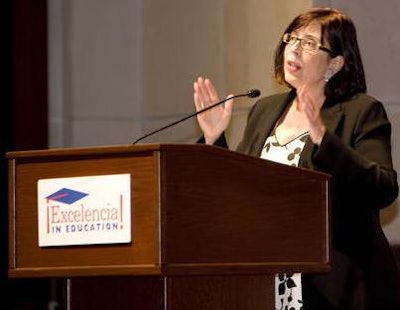 Sarita E. Brown, president of Excelencia in Education.
Sarita E. Brown, president of Excelencia in Education.WASHINGTON — Excelencia in Education, the only national initiative to honor programs boosting Latino academic achievement in higher education, celebrated success on several levels Wednesday at its eighth annual national conference.
The nonprofit organization cited three programs as standouts for 2013, one in each of the associate, baccalaureate and graduate levels.
Canada College of Redwood City, Calif., won on the associate level for the results of a program called “Math Jam” that addresses the low levels of math preparation among underrepresented students studying STEM (science, technology, engineering , math). This program allows students to test out of math courses and further strengthens student engagement and course success rates in other coursework. According to project director Danni Redding Lapuz, “Sixty-two percent of students who tested into remedial courses jumped to the next level math course or higher” once the Math Jam program was completed.
The baccalaureate award was given to the University of Texas at Brownsville for their Student Employment Initiative (SEI). Workshop panelist and program director, Juan Andres Rodriguez explained to an onslaught of eager attendees that “this program can be replicated at any university.” SEI provides on-campus paid internships beyond traditional work-study programs. Since 2005, the average time to graduate has been reduced from 5.71 years to 4.16 for the 2011-2012 academic year.
The graduate award went to the University of Texas Pan American in conjunction with the University of Texas at Austin for their cooperative doctoral program in pharmacy. Students from the Rio Grande Valley and Laredo regions of south Texas are encouraged to pursue a career in pharmacy in hopes that graduates will put their education to work in those areas. Another workshop panelist and director of the program, Dr. Lydia Aguilera, expressed that the key to student success in this program is “parental and family involvement.” Eighty-one percent of alumni have stayed to work in this area and 100 percent of students have passed board licensure exams on the first attempt for the past two years. Several finalists and honorable mentions were also recognized.
In accompanying panel discussions and workshops, a network of results-driven educators and policymakers shared their experiences and evidence-based best practices.
For example, the Accelerating Latino Student Success (ALASS) workshop featured panel discussions moderated by Excelencia in Education President Sarita E. Brown and Chief Operating Officer/Director of Research Deborah A. Santiago on topics that ranged from “What Works: Learning from Campus Leaders” to “Moving through the Ranks,” which featured community college and university presidents. Panelist and El Paso Community College President William Serrata stressed that “the largest disruptor of poverty is higher education.” El Paso, Texas, has consistently ranked in the top five as one of the poorest cities of its size according to the
U.S. Census Bureau.
Other workshop panelists made it no secret that some traditional media that rank colleges and universities on annual lists give schools that serve significant Latino populations a bad rap. University of Texas at El Paso President Diana Natalicio noted that certain published lists “are not in touch with whom their schools are serving and ignore the huge progress we are making.”
City University of New York at Lehman College President Ricardo Fernandez voiced similar sentiment. “Those lists don’t explain the context of what we are doing and how many lives we are changing,” Fernandez said. He then went on to state that it “takes courage to change culture.”
Attendees were privy to a venue where administrations, faculty and staff of higher education institutions who focus on Latino success could exchange information and ideas and network. One attendee, recruitment and community relations coordinator at Prince George’s Community College in Largo, Md., Samantha Howard, noted that “there should be more representation in the administrative offices that speak to Latino issues.” Along with Howard, many in attendance felt that events like this highlight that bilingual tutors, recruiters and administrators are critical to the nation’s fastest growing minority group.





















